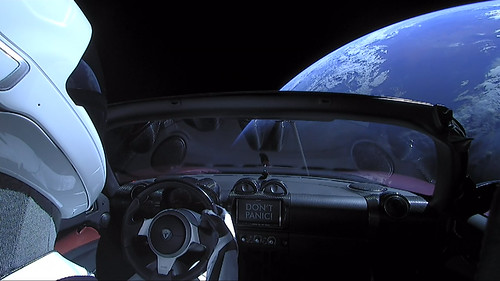I’ve got a new piece up at 3 Quarks Daily: Three Children of the Space Age: Elon Musk, Freeman Dyson, and Me. Dyson was born in 1923; I was born in 1947; and Musk was born in 1971. For that matter, Dyson was born in England; I was born in the United States, and Musk was born in South Africa – but that’s less important than the dates. We’re each of us alive today, but I was born 24 years after Dyson and Musk was born 24 years after me. Dyson was a mature adult of 45 when Armstrong and Aldrin landed on the moon; I was only 22, while Musk was not even two.
Here’s what I’m getting at: direct experience. What have you seen, heard, and done yourself. And if not you, then someone you know? I’ve not been to the moon myself, but I’ve talked with George Low, who was the President of RPI when I was there. And he ran the Apollo program. He surely knew the men who walked on the moon. So, I’m one degree of separation from them. Neither Dyson or Musk have been to the moon either, though – who knows, Musk might go there one day, or even to Mars?. But I’d be very surprised if each didn’t know or at least talked with someone who knew one or more of those astronauts. And it’s quite possible that each has talked directly with one or more astronauts.
And, if you’re willing to accept, for example, televised coverage, as not-quite direct experience, well then both Dyson and I experienced that when it happened, though we were at different phases of our lives. For Musk, though, those video clips are about the experiential past; they are about history. Dyson and I both talked with others at the time, when it happened. Any such conversation Musk might have had, those would have been about the past.
Why direct experience? It’s what I take to be our innate epistemology. Dan Everett, linguist and former Christian missionary, talks about his days among the Pirahã, when he was trying to convert them to Christianity. He’d tell them about Jesus and they’d ask if he knew or had seen Jesus himself or, at any rate, if he knew someone who knew Him. Dan, of course, had to tell them, that no, he didn’t and he didn’t know anyone who had. At that point his credibility went to zero. As far as the Pirahã were concerned, Dan was talking nonsense.
What about the astronauts themselves, did landing on the moon change them in any profound way? I don’t know. But surely that depends on their capacity for experience, no? If one has the imagination and generosity, then one can be profoundly affected. Otherwise, thanks, NASA, for picking up the tab. I had a blast.
But the question I posed in the title was different: Will space-travel be a transformative experience for humankind? What does that mean, for humankind? Is that merely the sum of the experiences of individual humans, with their differing capacities for experience, or is that something different?
Note, however, that I have the question from Freeman, and he didn’t talk of experience. In one place he talked of space travel “as a transforming force in the destiny of our species.” Note that word “destiny”. What does it imply? In another place, which I quote in the 3QD piece, he writes of manned missions “as changing the course of history in [a] fundamental way.” No experience in either case. We’re not talking about the same thing.
One might set out to change human history – Musk seems to see himself in that role – but whether or not one has done so, perhaps that can be observed only in historical retrospect. We’ll see.

No comments:
Post a Comment